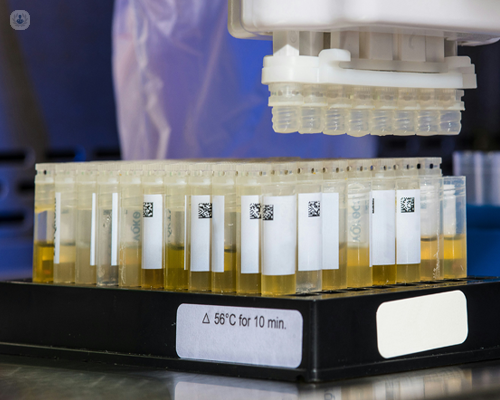Renal profile
The renal profile is a comprehensive set of tests designed to evaluate the function of the kidneys.

Here's a detailed breakdown of what the renal profile entails:
What is being analysed?
The renal profile analyses various parameters related to kidney function, including electrolyte levels, creatinine, and blood urea nitrogen (BUN).
Why perform the analysis?
The renal profile is performed to assess kidney function, diagnose kidney diseases, monitor the progression of kidney disorders, and evaluate the effectiveness of treatment.
When to perform the analysis?
The renal profile may be performed as part of a routine health check-up, especially for individuals with risk factors for kidney disease, or when symptoms suggestive of kidney problems are present.
What sample is required?
A blood sample and, in some cases, a urine sample may be required for the renal profile.
Is any prior preparation necessary?
In most cases, no special preparation is required for the renal profile. However, it is essential to follow any specific instructions provided by your healthcare provider, such as fasting before the test.
How is it used?
The renal profile provides valuable information about kidney function and helps healthcare providers diagnose and manage various kidney disorders, such as chronic kidney disease, acute kidney injury, electrolyte imbalances, and kidney infections.
What are the normal values?
The normal values for the components of the renal profile may vary depending on factors such as age, gender, and laboratory techniques. However, typical reference ranges include:
- Electrolytes (Sodium, Potassium, Chloride, Bicarbonate)
- Creatinine
- Blood Urea Nitrogen (BUN)
What does it mean to have altered values?
| Component | Normal range |
| Sodium | 135-145 mmol/L |
| Potassium | 3.5-5.0 mmol/L |
| Chloride | 98-106 mmol/L |
| Bicarbonate | 22-28 mmol/L |
| Creatinine | 0.6-1.2 mg/dL (adults) 0.5-1.0 mg/dL (children) |
| Blood Urea Nitrogen (BUN) | 7-20 mg/dL |
Altered values in the renal profile may indicate various kidney disorders or imbalances in electrolytes. For example, elevated creatinine and BUN levels may suggest impaired kidney function, while abnormal electrolyte levels can indicate dehydration, kidney disease, or other underlying health issues.
In conclusion, the renal profile is a valuable tool for assessing kidney function and diagnosing kidney disorders. If you have concerns about your kidney health or if your test results show abnormal values, it is important to consult with your healthcare provider for further evaluation and management.